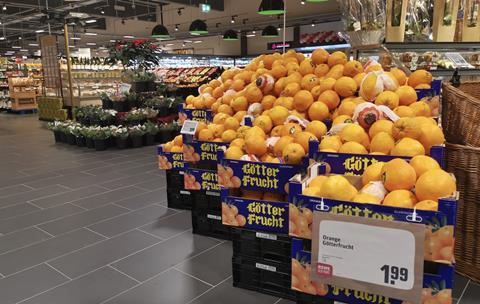Association and its interbranch members urge for a strong promotion policy and other instruments, backed by a ”substantial budget” to stimulate fresh fruit and vegetable consumption
Freshfel Europe and its fruit and vegetables interbranch organisations have reiterated the crucial role of a well-funded promotion policy and other related instruments to efficiently stimulate fresh produce consumption.

In this respect, it has called the European Commission’s decision to disproportionately decrease the promotion budget line for multi-programmes ”a completely incoherent move”.
“We welcome the many amendments proposed by the COMAGRI members of the European Parliament opposing the Commission’s proposed budget cut,” said Laurent Grandin, chairman of Freshfel Europe’s interbranch division and president of Interfel stated.
”The amendments also highlighted that the funding for multi-programmes should not only be restored but significantly increased.
“Organisations from the fresh produce sector have repeatedly shown a strong and growing interest in participating in multi-programme projects across all EU Member States, with a 52 per cent increase in applications between 2023 and 2024,” he said. ”The Commission itself was also encouraging the sector to embark on those projects.”
The consumption level for fruit and vegetables is still well below the WHO minimum recommendation of 400g/day/capita, Freshfel confirmed, with the latest EU average consumption figures dropping to 350g/day/capita.
Most worryingly, it said, the intake levels among Gen Z and Millennials were considerably lower.
“It is equally important that the European Parliament underlines the need to stimulate consumption among the youngest, which constitute the consumers of the future and are today among the weakest consumers,” noted Grandin.
”The Parliament’s recommendations to reinforce the efficiency of the fruit and vegetables distribution scheme in schools as well as its related education programme is an important message for the European Commission for its upcoming priorities. Reaching these objectives implies increased funding.”
Avoid previous mistakes
With a new legislative term is about to start, Freshfel outlined that it was important that the Commission work programme avoids the ”mistakes, the lack of coherence, and the ambiguity” of the previous policy governance.
“Fruit and vegetables play a vital role towards a more sustainable and healthy diet in line with the EU’s ambition to shift consumer attitudes towards a plant diet, recognising the low environmental impact of fruit and vegetables and the unique health benefits of fresh produce,” explained Philippe Binard, general delegate of Freshfel Europe.
”Regretfully, the last legislative term failed to take the necessary steps to guarantee such a transition and a shift towards healthier food habits, with the risk of favouring ultra-processed plant-based products instead of an actual plant diet based on fruit and vegetables, which can be consumed raw or with minimal processing.”
The recent recommendations of the report on the Strategic Dialogue on the Future Agriculture highlighted the importance of a greener plant diet, in which fruit and vegetables play a key role.
New opportunity
Freshfel Europe president Salvo Laudani underlined what a major new opportunity this represented.
“The Commission should remove obstacles that prevent stimulating fresh fruit and vegetable consumption as an essential part of the diet for Europeans,” he commented.
”From the last legislative terms, these hurdles included unnecessary red tape, added costs, and complex and unnecessary requirements.
”Several policy initiatives such as plant protection, packaging, or labelling negatively impacted the freshness, convenience, quality, and marketing of fresh produce, and also damaged the attractiveness and competitiveness of fresh fruit and vegetables in the overall food assortments,” Laudani noted.
”These excessive restrictions against fruits and vegetables should be replaced by positive discrimination.”
Freshfel called on decision-makers to reinforce the position of fruit and vegetables at the centre of a healthy and affordable diet, a shift that would benefit the health of EU citizens and the environment alike.
As a first significant step, the association called on the Commission, in consultation with the Council and Parliament, to reverse the budgetary cuts impacting fresh produce promotion.
”With food security and productivity issues coming to the fore, the EU must during the upcoming legislative term further and more strongly support the essential fruit and vegetable sector, in addition to protecting its competitiveness and resilience in challenging times,” it added.



